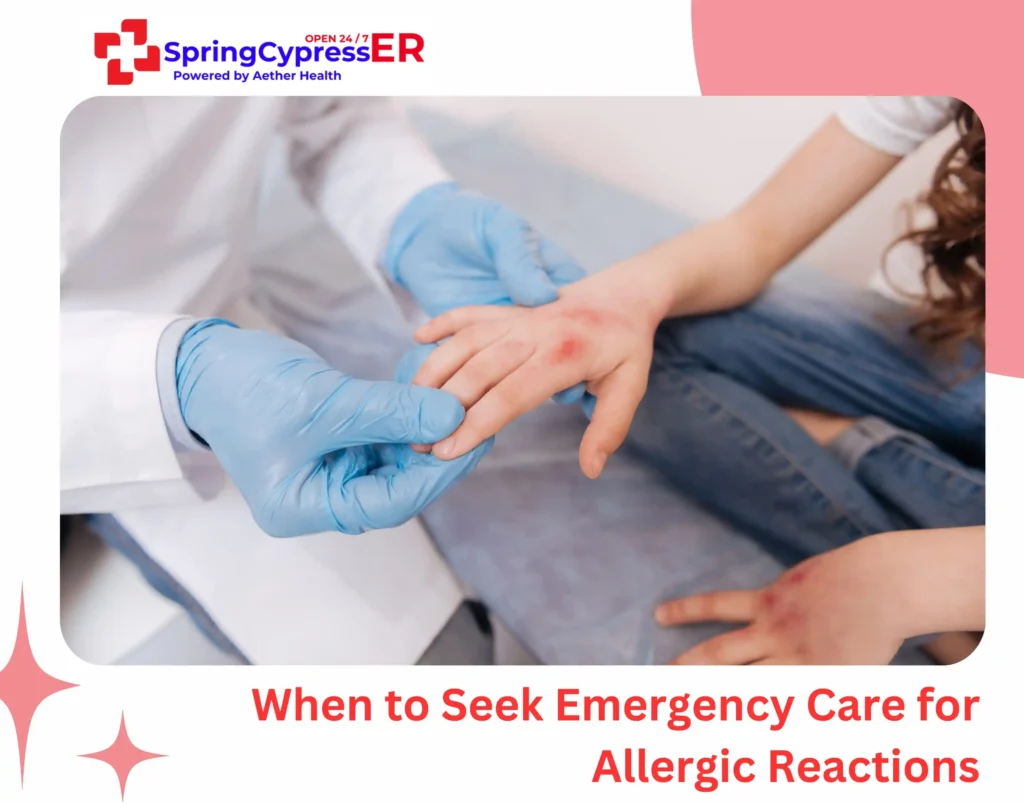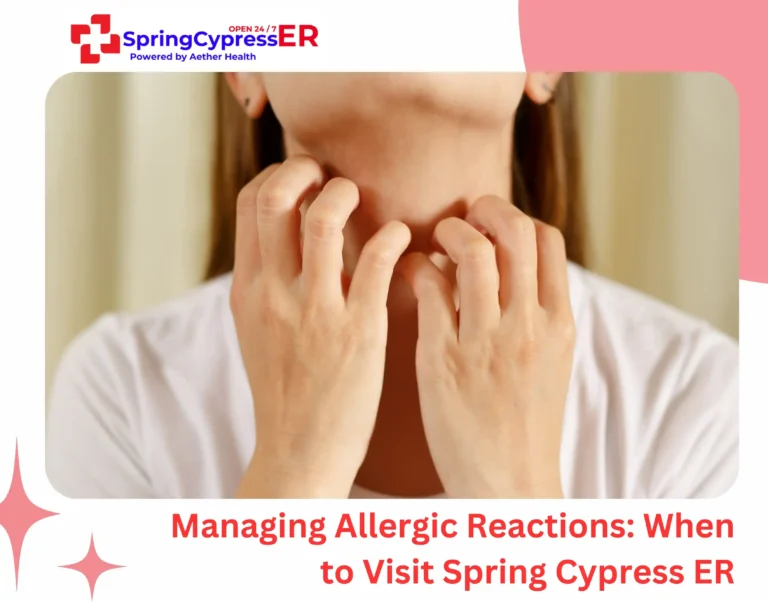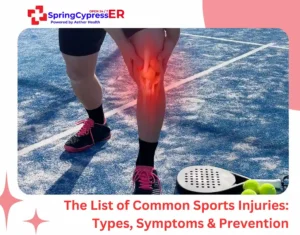Allergic reactions can be scary and overwhelming, especially when they strike out of nowhere. While some reactions might be mild, others can turn serious in the blink of an eye. It’s not always easy to know when to wait it out or when to take action.
In our emergency room, we’ve treated countless allergic reactions Spring Cypress families experience throughout the year. Whether it’s a small rash or a life-threatening anaphylaxis, our dedicated team is ready 24/7 to provide the care you need when you need it most.
Understanding Allergic Reactions

Allergic reactions happen when the immune system reacts excessively to a generally harmless substance known as an allergen. Common allergens include pollen, pet hair, insect stings, certain foods, and medicines. While mild allergies might cause discomfort, serious reactions can be life-threatening and need urgent medical care.
Common Causes of Allergic Reactions
- Food Allergies: Peanuts, shellfish, dairy, and eggs are among the most frequent triggers, often causing mild to severe reactions, including anaphylaxis. Even trace amounts can be dangerous for highly sensitive individuals.
- Insect Stings: Stings from bees, wasps, and ants can lead to life-threatening anaphylactic reactions in some individuals, requiring immediate medical attention. Symptoms may include swelling, difficulty breathing, and a rapid drop in blood pressure.
- Medications: Antibiotics, pain relievers, and anesthesia can provoke allergic responses ranging from mild rashes to severe respiratory distress. Identifying drug allergies early is crucial for avoiding dangerous complications during medical treatments.
- Environmental Allergens: Pollen, dust mites, and mold spores are common culprits behind seasonal allergies, leading to sneezing, congestion, and asthma flare-ups. These allergens can significantly impact daily life, particularly for individuals with respiratory conditions.
- Latex and Chemical Sensitivities: Exposure to certain substances in gloves, adhesives, and cleaning products can trigger skin reactions, hives, or even respiratory distress. Healthcare workers and individuals with frequent chemical exposure are at higher risk.
Symptoms of Allergic Reactions
Allergic reactions can present with varying degrees of intensity, from mild discomfort to life-threatening emergencies. Identifying symptoms early helps determine when urgent medical care is required.
Mild to Moderate Reactions
- Runny or congested nose
- Watery, itchy eyes
- Small hives or mild skin irritation
- Slight swelling of the lips or face
- Mild nausea or digestive discomfort
Severe Reactions (Anaphylaxis)
- Trouble breathing or wheezing
- Significant swelling in the throat, tongue, or face
- Fast or irregular heartbeat
- Intense stomach pain, vomiting, or diarrhea
- Lightheadedness or loss of consciousness
- Disorientation or extreme anxiety
When to Seek Emergency Care for Allergic Reactions

Not every allergic reaction requires emergency care, but certain symptoms signal a critical situation that needs immediate medical attention. Seek urgent treatment if you or someone else experiences:
Severe Swelling in the Face, Lips, or Throat
- Swelling in these areas can obstruct breathing, posing a serious risk.
Breathing Difficulties or Wheezing
- Restricted airways can rapidly escalate, leading to respiratory failure.
Chest Discomfort or Tightness
- A potential sign that anaphylaxis is impacting heart function.
Fainting or Severe Dizziness
- A sudden drop in blood pressure, known as anaphylactic shock, can cause loss of consciousness.
Widespread, Rapidly Spreading Hives
- Extensive skin reactions may indicate a worsening allergic response.
Persistent Vomiting or Intense Stomach Pain
- Common with food or medication allergies, severe digestive symptoms should not be ignored.
Immediate Steps to Take During an Allergic Reaction
Before arriving at Spring Cypress ER, taking prompt steps can help manage symptoms:
- Use an Epinephrine Auto-Injector (EpiPen) if Available – This can provide temporary relief from severe symptoms.
- Stay Calm and Monitor Breathing – Anxiety can make breathing difficulties
- Lie Down with Legs Elevated – Helps stabilize circulation if feeling lightheaded.
- Avoid Further Exposure – Prevent contact with the allergen to stop symptoms from escalating.
- Seek Immediate Medical Help – Call 911 or head to the ER, as severe reactions can worsen quickly.
Emergency Care for Allergic Reactions at Spring Cypress ER
Medical professionals at Spring Cypress ER provide rapid intervention to ensure patient safety and recovery. Treatment may involve:
- Epinephrine Administration – The primary treatment for severe allergic reactions
- Oxygen Support – Aids those struggling to breathe
- IV Antihistamines and Steroids – Helps control inflammation and allergic symptoms
- Airway Support – Intubation may be necessary in cases of severe throat swelling
- Close Monitoring – Ensures symptoms do not return after treatment
Preventing Future Allergic Reactions

Managing allergies involves proactive steps to minimize risks and prepare for potential emergencies.
Identify and Avoid Triggers
- Read food labels carefully.
- Use insect repellent and wear protective clothing.
- Opt for hypoallergenic products.
Carry Emergency Medication
- Always have an epinephrine auto-injector if prescribed.
- Keep antihistamines readily available.
Wear a Medical Alert Bracelet
- Helps first responders provide appropriate treatment in an emergency.
Consult an Allergy Specialist
- Allergy testing can help pinpoint specific triggers.
- Immunotherapy may reduce sensitivity over time.
Key Takeaway
An allergic reaction can escalate in moments, making fast medical care crucial. At ER of Spring Cypress, we’re ready 24/7 to provide expert treatment for allergic reactions. Whether it’s severe swelling, breathing difficulties, or a rapidly progressing reaction, our team is equipped to act quickly and effectively. When every second counts, you can trust us to deliver the care that keeps you safe.
FAQs
How to calm down an allergic reaction?
Take an antihistamine, avoid the allergen, and use an epinephrine injector if symptoms are severe. Seek medical help if needed.
What’s the best home remedy for allergic reactions?
A cold compress can soothe skin reactions, while honey or turmeric may help with mild allergies. Always consult a doctor for severe symptoms.




